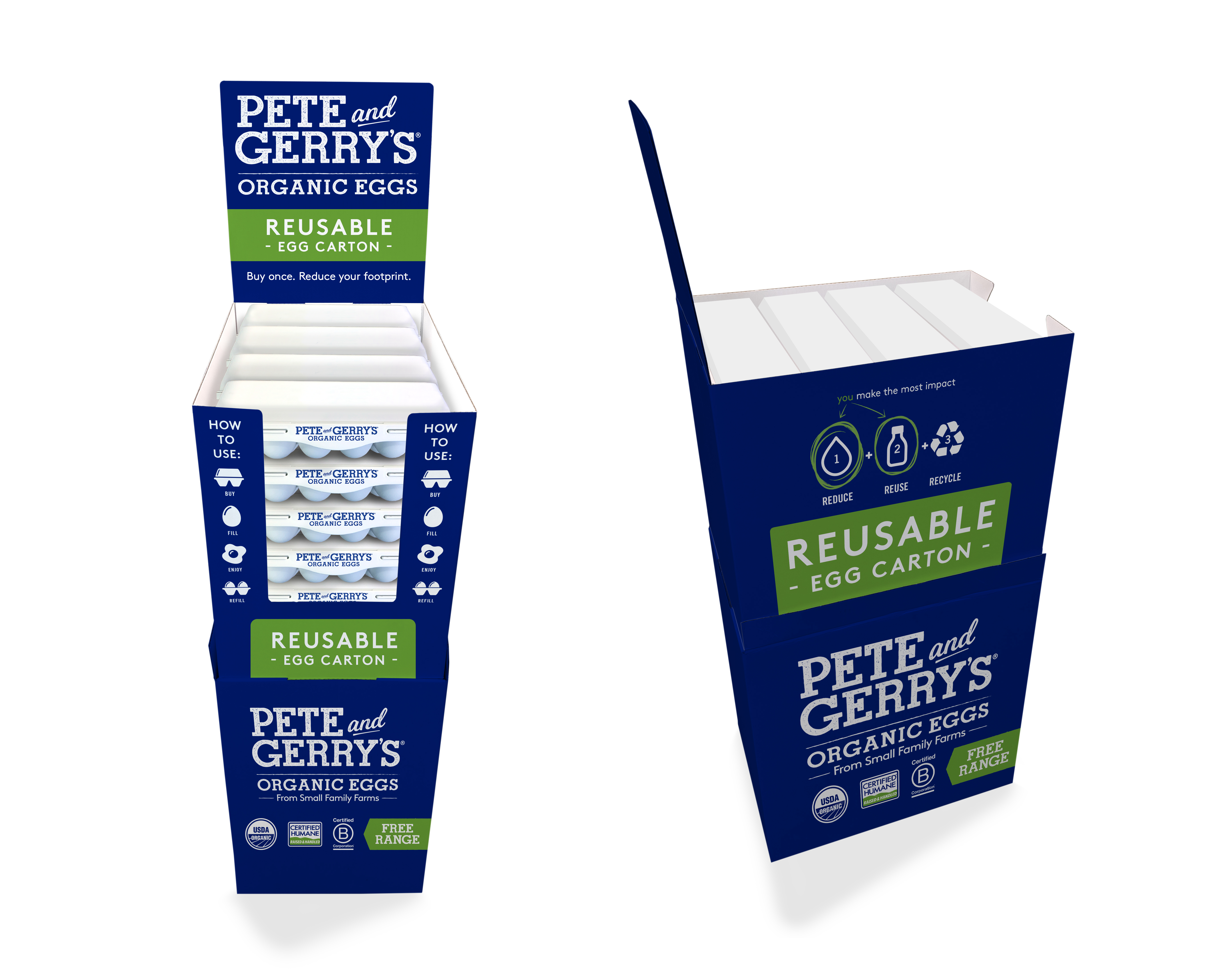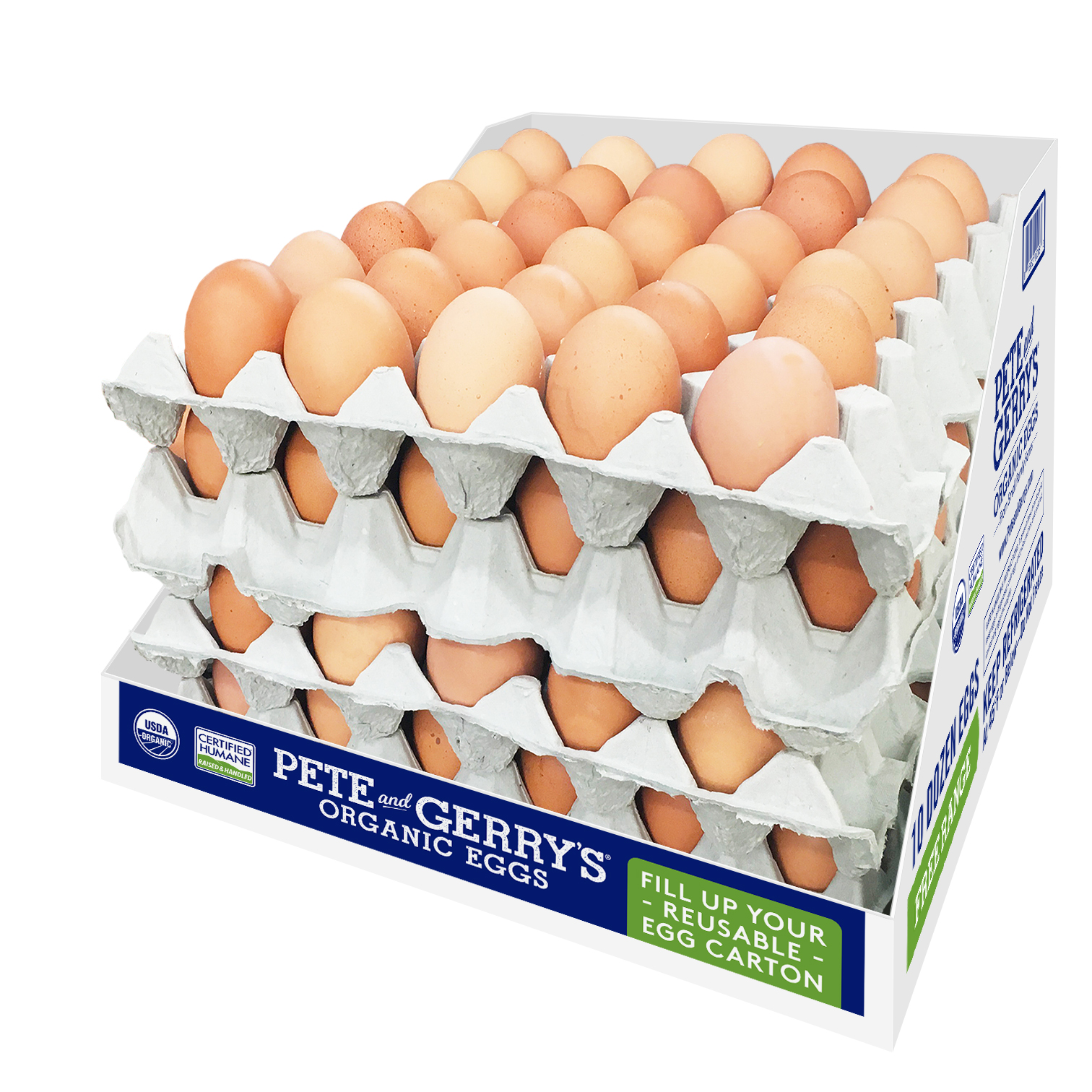
Organic egg producer Pete and Gerry’s is the first in its industry to test reusable egg cartons. They're made from recycled, BPA-free plastic and cost $3, but using them will give customers a discount on their dozen eggs.
"Reusable cartons are a logical next step in our ongoing commitment to sustainability, moving consumer behavior from recycling to reuse,” said Jesse Laflamme, CEO of Pete and Gerry’s, in a press statement. “We plan to expand this program in 2020 to reach even more consumers and amplify the program's impact with major retailers clamoring for this type of sustainable innovation."
The certified B Corporation has been piloting the initiative at Hanover Co-op Food Stores in New Hampshire and Vermont over the past six weeks. Customers are "loving the idea that [the cartons are] robust, and they can cut down on their waste,” Laflamme told Fast Company. And he hopes other retailers will make space for the cartons as well.
As the largest U.S. producer of free-range, organic, Certified Humane eggs, the brand can be found at major retailers in almost every market, including Target, Safeway and Walmart. Though Whole Foods may be the next logical partner for the reusable roll-out because of its sustainability-minded clientele, Laflamme told FastCompany.
 (Image: Pete and Gerry's reusable egg cartons are available for purchase at designated retail displays and can be refilled with loose eggs elsewhere in the store.)
(Image: Pete and Gerry's reusable egg cartons are available for purchase at designated retail displays and can be refilled with loose eggs elsewhere in the store.)
Reusable options take hold in the retail sector
Reusables are coming into fashion across the retail sector. You’d be hard pressed to find a disposable grocery bag in many states. Californians and Hawaiians are already used to bringing their reusable totes on shopping trips. And some cafes offer discounts when customers forgo the disposable cup, lid and sleeve for their own reusable mug.
Legislation and incentives haven’t gone much further than bags and cups yet, but that doesn’t mean customers don’t appreciate zero-waste options from the brands they love and the stores they patronize. The public is waking up to the political complexities of recycling, and many recognize that putting an item in the recycling bin doesn’t necessarily mean it will be recycled, especially as waste export markets shrink.
Instead of relying mostly on recycling to keep their ecological footprints small, many consumers are beginning to reduce waste on their own—and research indicates they expect brands to help them. Sixty percent of U.S. consumers want packaging options that don't involve single-use plastic, according to a recent survey. In the U.K., around half of consumers say they're willing to pay more for the privilege of leaving single-use behind.
 (Image: Once they've purchased a reusable carton, shoppers can fill it up at a Pete and Gerry's display of loose eggs which are discounted from a standard dozen, allowing the carton to pay for itself over time.)
(Image: Once they've purchased a reusable carton, shoppers can fill it up at a Pete and Gerry's display of loose eggs which are discounted from a standard dozen, allowing the carton to pay for itself over time.)
"Reuse is even better than recycling..."
For its part, Pete and Gerry’s has been chasing more sustainable packaging for years.
The company launched recycled plastic packaging in 2012 based on third-party lifecycle analyses. Canadian research company Quantis found clear recycled PET packaging to be either “superior” or “vastly superior” in most cases, compared to to pulp or polystyrene, when considering environmental and human factors. And if customers don’t have the option of recycling plastic in their area, Pete and Gerry’s takes back their cartons for free.
"Our consumers expect Pete and Gerry's to be on the leading edge of sustainability," said Laflamme. "Like many other consumer packaged goods companies, we recognize that reuse is even better than recycling, and we're proud to be at the forefront of this growing movement to help reduce the impact of packaging on the planet.”
“This is a pilot program, but we are emboldened by the initial results and committed to new ways of thinking about how we deliver on our promise to be a responsible force for good."
Image credits: Erol Ahmed/Unsplash and Pete & Gerry's

Roya Sabri is a writer and graphic designer based in Illinois. She writes about the circular economy, advancements in CSR, the environment and equity. As a freelancer, she has worked on communications for nonprofits and multinational organizations. Find her on LinkedIn.














